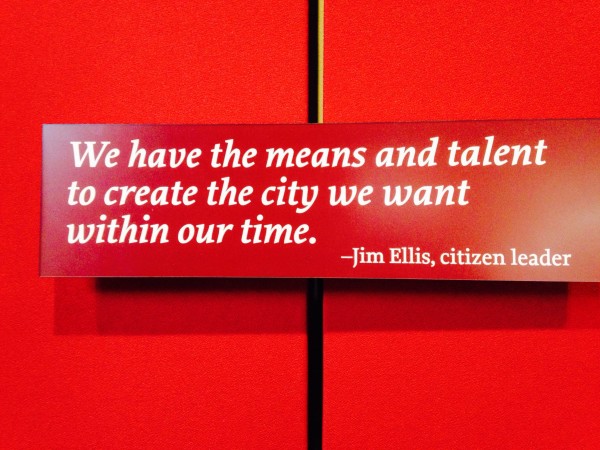 The Underground Tour has a guide who says, “If it’s a dumb idea, Seattle will stick to it!” (Stuck drill, anyone?)
The Underground Tour has a guide who says, “If it’s a dumb idea, Seattle will stick to it!” (Stuck drill, anyone?)
That might be the past and stereotype City Council is currently trying to avoid.
We’ve all looked around by now, over the past couple of years, as we walk anywhere in the city limits. We don’t even have to question anymore what a new building will be, because nine times out of ten the answer is, “condos.” Meanwhile, your Person of Color neighbor is being evicted, even though his/her family helped to build the culturally-rich community you love.
It’s not just the POCs. It’s the gays, too. Seattle, despite what SoCal-ers may like to believe, just doesn’t really have the “rich gay suburbanite couple” stereotype that larger cities have built since the Gay ’90s. Our queers are EVERYWHERE, scattered. And most of us are transplants from all over the country and world. (By now most of us know at least one LGBT person from another country who got here by the skin of their teeth to escape persecution.)
And who could blame us? It’s fucking beautiful here in our mountainous little bowl. As such, the Seattle Gay Scene (see what I did there?) is not a hardcore contingency of established towny couples with 2.5 kids and a few dogs. Yeah, they exist, but just look at Pride and how packed it was with people from all over the income spectrum. The recent mass influx of worker bees, brogrammers, Boeing people, and immigrants, coupled with national economic factors, has resulted in the “oh yay, more condos,” sentiment. Folks, we’re not talking about single family homes. We’re talking about multi-unit properties ideal for singles, couples, and small families. Here’s hoping future units will look less like soul-less, glass-fronted, tiny-balconied, sterile boxes (where have all the good architects gone?). Let’s keep the rooftop gardens, though.
On July 13, Mayor Murray unveiled the 65-point long packet of recommendations from the Housing Affordability & Liveability Agenda advisory committee (HALA). According to him, the proposal involved a lot of compromises from all sides of the greater housing issue. Supposedly it was a ten-month process of herding cats. Among the bullet points were linkage fees, tax breaks, up-zoning, and the possibility of 94% of single family homes not actually being demolished or repurposed. Or something like that. Frankly, when specifics arise in terms of zoning and construction, it sounds like the worst word problem in math class…the one with the trains, but somehow there’s a right angle involved. Oddly enough, the residential linkage fees were “removed” on the same day this proposal was revealed.
After the press conference, Councilmember Sawant and HALA member Jon Grant expanded on the recommendations by hosting another one in a different room. Grant said that while the packet was an excellent start, people need housing at this very moment, and we require more robust measures be taken to secure our affordable housing right NOW. He’s correct on that point: tenants are getting notices of rent hikes in today’s mail. Low- and mid-income people are being forced to move outside the city as you’re reading this.
Apparently rent hikes and developers’ methods are based on a currently “speculative” market. This means that one landlord with a building older than a few years can look across the street at a new, updated apartment complex and find out how much the new place is charging. Same landlord then says, “They’re charging $1,600 a month, why can’t I charge just slightly less than them but twice my current price, when we have the same gorgeous vistas and convenient location?”
Rent control aims to curb that speculation, as well as provide reasonably affordable housing for those of us who make less than $50,000/year. Breaking: This means MOST of you reading this—the backbone and working class of society.
Last Monday, the 21st, Councilmembers Kshama Sawant and Nick Licata hosted a debate regarding rent control. The opposing side was made up of Washington State Representative Matt Manweller and Growth & Development Lobbyist Roger Valdez. Because the HALA recommendations won’t come to fruition for at least a couple of years—between talking, planning, voting, and implementation—Licata and Sawant are looking for affordable housing solutions that will help in the short term, as well as pragmatically plan for future housing booms or busts.
No lie, the anti-rent control side probably felt a little hostility from the audience, because most people seemingly arrived ready to applaud for whatever came out of Sawant’s mouth. As such, Valdez was quick on the “stop the clock” draw, while Rep. Manweller immaturely responded to hecklers. Throughout, as you can see for yourself if you watch the video, Licata and Sawant readily referred to current research and data from other cities with rent control firmly in place. Manweller relied heavily on articles not from this century. The opposing side might have had more credibility if not for their behavior and outdated information. Shame.
But once you cut through the bullshit and “reality zone” comments, you’d see that the pro side had decent thoughts born of careful consideration. While Licata maintained a calm and cool demeanor as he stated his reasons with up-to-date information, Sawant repeatedly iterated that it’s not JUST rent control we need. Abolishing the ban on rent control, at least for the City of Seattle, must be a first and immediate step we take to enact a HUGE plan of action for affordable housing. This includes linkage fees and closing legal loopholes, among other plans, such as New York City and San Francisco have historically had to work through.
If done correctly, allowing Seattle to have rent control would result in communities with more mixed-income housing. Not just rampant South Lake Union-style condos. Linkage fees in conjunction with rent control may allow people to have (probably basement unit) apartments in newer, updated buildings where someone on the top floor can get the mountain view at $2,000/month. Imagine a building where you can meet your future rich ex-husband or wife while you’re doing laundry before returning to your middle-level floor—that’s what the two policies can do. Conversely, if you don’t want “those kinds of people” in your complex, it’s time to call your therapist.
The opposing side kept comparing housing to smaller, more tangible things, like bread and cars. Terribly sorry, but they’re not the same, by a long shot. Valdez maintained that rent control punishes builders, and both he and Manweller said the solution was simply to build more to keep up with demand. To which Sawant replied with the sentiment, “What good is all that housing if no one can afford to live in it?” Likewise, Valdez said that operating costs are rising faster than rents, and Licata and Sawant want to take away the landlords’ revenues that would go toward operating costs. To which this writer questions: How can operating costs be stabilized if all we build is high-rent, newer buildings rather than place rent control on already existing properties or placing linkage fees on new developments?
Apodments also came up in the conversation, with the pro side saying they weren’t actually affordable, and the opposing side saying that the people who nixed them simply didn’t want to live in them. Sure, not everyone wants an Apodment and people should have the choice to live in them. But do we want a city of mixed housing options, or just a ton of Apodments and condos?
Rep. Manweller attempted to convey that having rent control would further building flipping, in the way that landlords would repurpose their buildings from apartments into condos or retail/office space, which would in turn create less affordable housing. Licata rebutted that condo conversions have been happening since the late ’90s when he was elected to office, so rent control had no effect there. Older units are charging more because they’re seeing newer units doing the same, and “that’s why we need to regulate the market” now.
Valdez and Sawant argued about trickle-down economics, but as we are all aware, the principle has been proven not to work. Too many sources can be cited stating it. Along the same lines, Rep. Manweller stated that capping rents creates lower tax bases, which decreases funds for cities to maintain parks, schools, and public services. There may be a flaw in that argument, as rent control would help keep people within the city. When there’s more money to be spent and earned inside the city limits, everyone would theoretically have more money to give to the city for said maintenance, no? If nothing else, tax bases should stay stable. Especially if HALA’s and the Mayor’s plans to focus on denser urban areas with mixed housing comes to pass. Economists and accountants, feel free to chime in here.
 Again, rent control is NOT a cure-all. The pro side is not saying that. Rather, it is a crucial, viable, and urgent step we can take to stop landlords from issuing 100-200% rent hikes. Seattle is a transient city, full of diverse cultures and income levels. Wouldn’t it be nice to have far greater options to move to the next time you’re looking for a new abode? How about instead of being forced to live farther from downtown because of your income, you actually get to pick from a bevvy of places that suits your needs and decreases your transportation costs?
Again, rent control is NOT a cure-all. The pro side is not saying that. Rather, it is a crucial, viable, and urgent step we can take to stop landlords from issuing 100-200% rent hikes. Seattle is a transient city, full of diverse cultures and income levels. Wouldn’t it be nice to have far greater options to move to the next time you’re looking for a new abode? How about instead of being forced to live farther from downtown because of your income, you actually get to pick from a bevvy of places that suits your needs and decreases your transportation costs?
It is not something to be afraid of. Other, larger cities have tried it, and have gone through much trial and error to work out the kinks according to local and state laws. Sawant pointed out that as an effort to keep varying incomes within the cities and lowering commute times, people have voted to keep rent control in place (61% consensus in California). Rep. Manweller pointed to historical examples that said rent control led to increased displacement, gentrification, and unkempt or dilapidated properties. He failed, however, to take into account older cities with plenty more established housing in highly dense areas, some of which has consistently updated properties older than Seattle’s Great Fire. He also didn’t delve into how most cities with rent control have experienced a proportionally slower rate of growth over a couple of centuries, as opposed to Seattle’s huge boom going on 10 years of the 21st century. Sawant rebutted by saying that without rent control, gentrification and ethnic/POC displacement is happening right NOW.
Valdez was quick to point out that the debate was pretty much moot, as rent control is currently banned according to state law. But, as many of us rampantly argue, Seattle is to Washington as New York City is to New York. As the economic epicenter of the state, we should have exceptions to certain laws, or at least different policies, that don’t make sense in places like Ellensburg, Spokane, or the Tri-Cities. As Licata alluded, Seattle should be able to fix its own problems, with our resources, smarts, and growing population of helpful citizens.
Put differently, Sawant stated in a recent press release that the recent “victory” for the $15 minimum wage increase will mean nothing if rents continue to skyrocket. That just makes sense. What good is a pay increase if you’re still shelling out $13 out of that $15 every month toward a roof over your head?
Seattle is in a unique position. While the rest of the country was either stuck in under-developed, low-income limbo, or else growing like crazy from the onset of the Information Age, dot com bubble, or real estate boom, our city stayed quiet. Purportedly, it used to be more “towny,” like Portland still is. Then the 2000s media, Californians, and tech companies who wanted cheaper office space decided that it’s actually pretty awesome here, and the region has a lot to offer. At least, that’s what it looks like, from what this writer has learned. That’s probably too simplistic an assessment.
Long story short, Seattle is not showing any signs of slowing down. We’re one of the few cities that kept growing and recovering during and despite the recession. The rest of the country has been either at a standstill, declining, or moving at a snail’s pace, comparatively. This is still where people want to be. Hell, our Pride might have been even better had the SCOTUS decision on marriage equality come before Washington State legalized it. And that’s just one of the reasons Seattle is desirable. Nothing further needs to be said here, as you can certainly come up with your own positive motivations to thrive in our city. And for many half probably the majority of us, enabling rent control would HELP us to stay. Not just for the lower income people who need it, but for the diverse communities it could create.
Yes, it’s effing complicated. Housing involves the related issues of infrastructure, transit, environmental protection, and overall progress into making Seattle the utopia we transplants keep thinking it is (or at least thought, before moving here). The affordable housing problem is a huge one, and fixing it involves many components. Yet with all of the research, data, and history behind us from other cities in the USA, there’s abosutely no reason not to at least try rent control. You and Manweller can go ahead and look at the varied 20th-century past of the policy.
Who’s to say we can’t do BETTER? Isn’t it about time we live up to being the intelligent, resourceful city we caffeinatedly* tell the rest of the country we are?
*New word, I know. It applies.




















